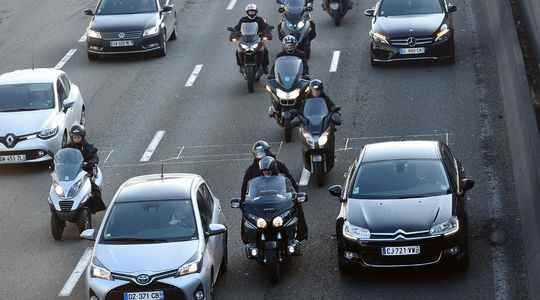After the departmental roads and certain areas of the city center, it will perhaps soon be necessary to ease off on the highways. The issue of energy supply which is troubling France brings to the fore that of fuel savings. Emmanuel Macron even declared, during his speech on July 14, the need to “collectively return to a logic of sobriety”. The opportunity for certain measures developed by the Citizen’s Climate Convention to resurface, including that of lowering the speed to 110 km / h on the motorway.
A survey carried out by Ifop earlier this week reveals that 63% of French people would be willing to reduce their speed specifically in order to save fuel. A possibility swept away by the spokesman of the government, Olivier Véran, Thursday, July 21, who confided on France info that there would be no “hidden measures which would concern new constraints”. A caution no doubt inherited from the memories of the Yellow Vests movement which had fed on the discontent of the passage to 80 km / h on departmental roads in 2018. The debate is still politically very inflammable but socially better understood with prices of the fuel at the pump which exceeds two euros per litre.
Up to 20% fuel savings
Reducing your speed to 110 km/h allows you to spend less fuel, up to 20%, according to a note from Négawatt. The solution is even suggested by the International Energy Agency (IEA), which considers it the most effective short-term measure to do without Russian oil. In 2011, Spain tried the experiment for four months at the time of the crisis in Libya, which was one of the country’s main oil suppliers. Result: a reduction in petrol consumption by 15% and diesel by 11%. Savings estimated at 360 million euros per year on fuel consumption in 2018 and which would be mechanically greater today when prices are exploding.
The equation of lowering speed to lower fuel costs is nothing new. This is even the origin of the speed limits in France, introduced during the first oil shock in 1974, and initially thought to be temporary. At the time, there was no question of road safety but of an economic response to soaring petrol prices. Today, environmental associations are taking the opportunity to shine the spotlight on the possibility of acting both on the wallet and on the planet: “It is to combine the useful, the protection of the environment, with the pleasant , because we save money”, summarizes Stéphen Kerckhove, the director general of Acting for the environment, the association which commissioned the study published this week at Ifop. Stéphen Kerckhove also insists on the speed with which such a measure with “immediate and inexpensive” effects can be decided.
Because, in addition to being the fruit of a geopolitical consideration, the measurement of the lowering of the speed on the motorway responds to environmental concerns. By lowering fuel consumption and reducing the force of tire friction, fewer fine particles escape during a journey. “The more you lower the speed, the less you emit nitrogen dioxide which contributes to ozone pollution”, explains Doctor Thomas Bourdrel, founder of the Strasbourg Respire association. This is not without consequences for health since the doctor recalls that “there is a 40% higher risk of sudden cardiac death for people living less than 50 meters from the main roads”. In the longer term, lowering the speed on the highway “also sends a message to manufacturers because there would be less need for a heavy car capable of withstanding very rapid crashes”, indicates Stéphen Kerckhove.
More than 1 billion euros of lost time
“Let’s leave the choice to the French”, retorts Yves Carra, spokesperson for the Automobile club association. According to him, “it is necessary that the highways, which are still paying, retain an interest: that of saving time”. He also points to the risk of a transfer of traffic to national roads, where the speed is sometimes limited to 110 km / h, and which are more accident-prone than motorways. He also underlines the economic loss linked to this transformation, because “companies are organized around 130 km/h”.
A study carried out in 2018 by the Sustainable Development Commission showed that the economic losses, caused by the increase in travel times, amounted to 1.15 billion euros. A sum to be compared to the gains obtained by fuel savings. Pierre Chasseray, general delegate and spokesperson for the association 40 million motorists, also pleads for the responsibility of motorists: “It makes no sense to want to impose speed limits on an economic or environmental basis”. For him, it would above all be necessary to think of integrating the user and his behavior: the speed practiced is already 118 km / h on the motorway in France, according to the Observatory of speeds.
Some environmental defense associations are also skeptical about the real impact of such regulations. “What matters most is the type of vehicle, not so much the speed. A large SUV at 110 km/h will always consume and pollute more than a small electric vehicle at 130 km/h”, notes the director of the Respire association, Tony Renucci. And even the most fervent defenders of the measure, like Karima Delli (EELV), president of the Transport Committee of the European Parliament, admit that it is not enough. Karima Delli thus specifies that if its effectiveness is indisputable, “we will not save the climate by changing the speed, we must rethink the whole transport policy”.
